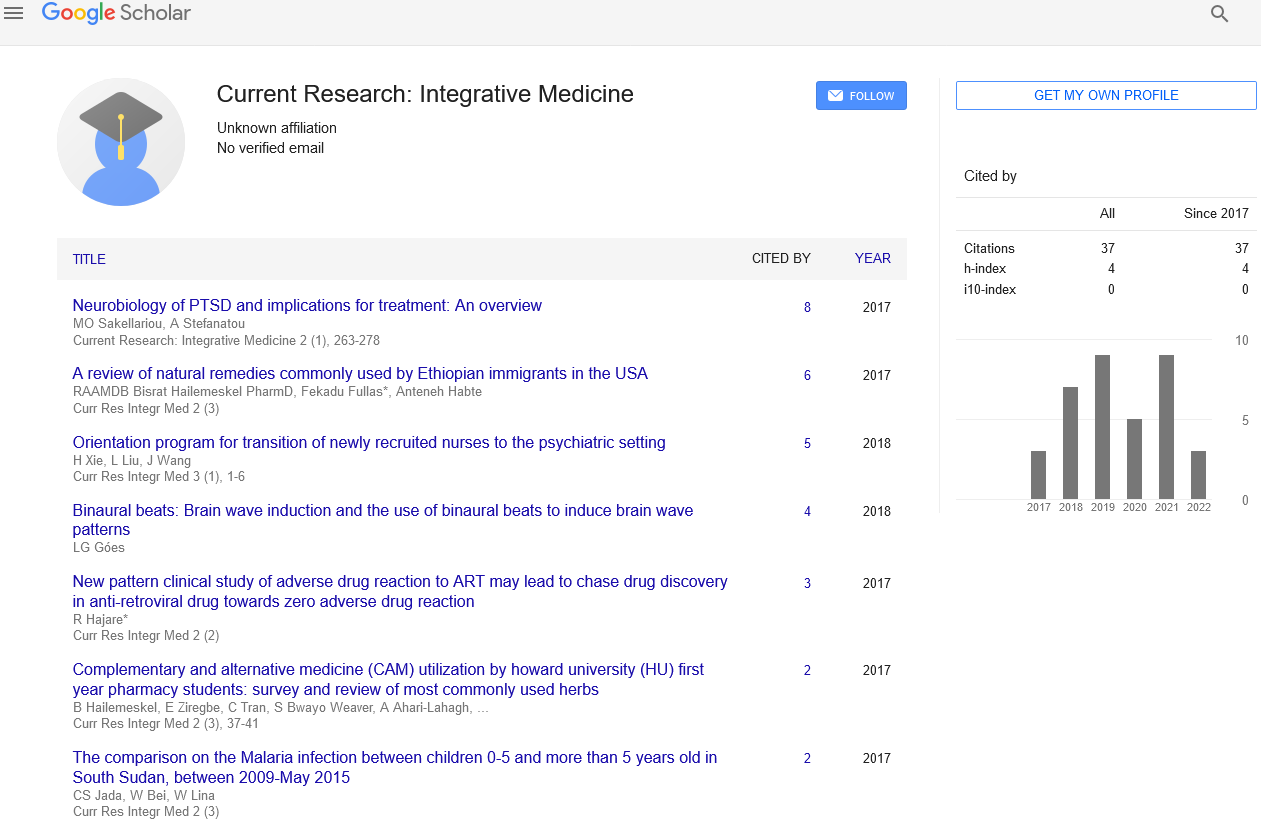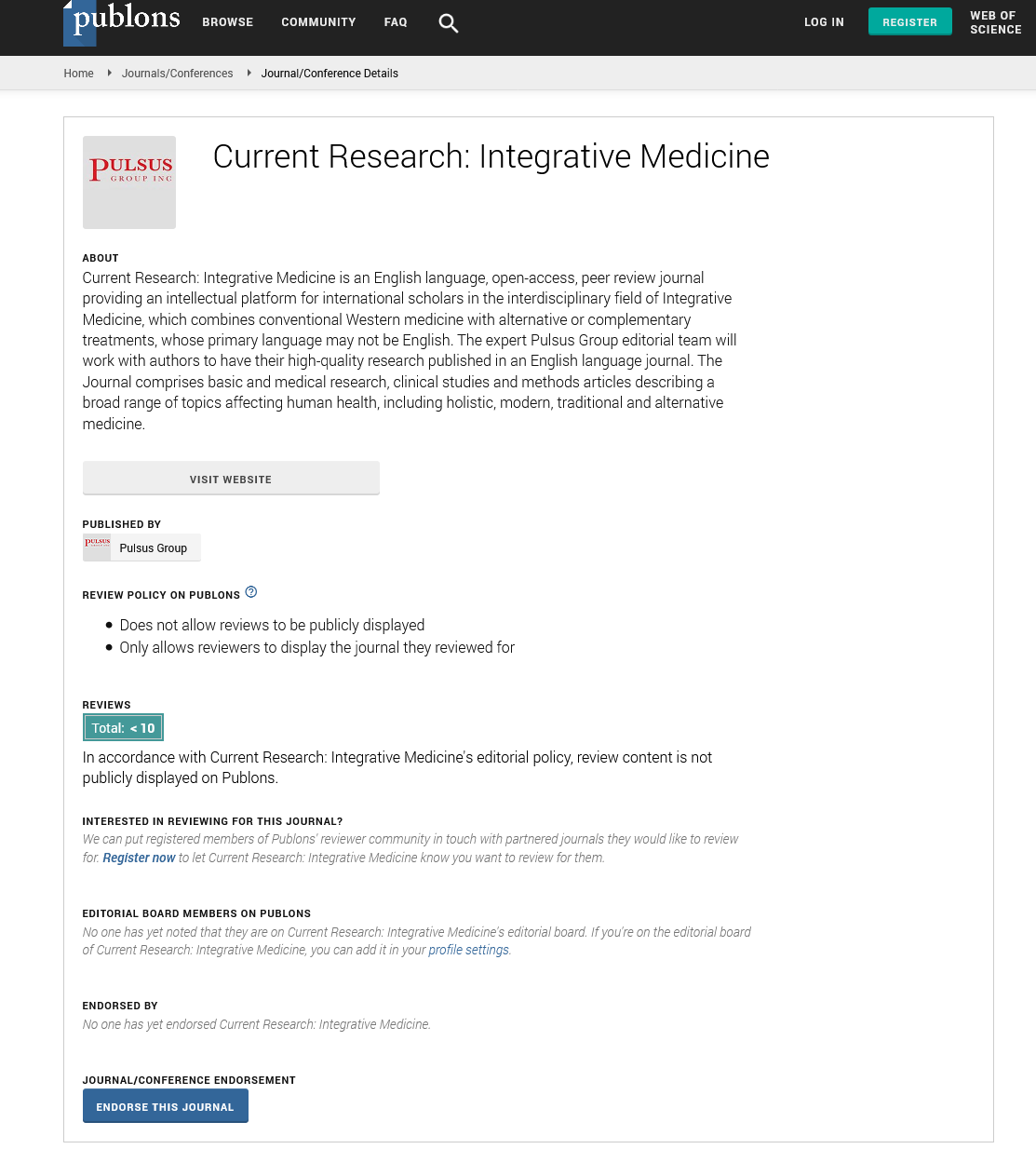Is nutrition a tenet of lifestyle but not a medicine ?
Received: 20-Sep-2022, Manuscript No. PULCRIM-22-5509; Editor assigned: 22-Sep-2022, Pre QC No. PULCRIM-22-5509 (PQ); Accepted Date: Sep 27, 2022; Reviewed: 24-Sep-2022 QC No. PULCRIM-22-5509 (Q); Revised: 26-Sep-2022, Manuscript No. PULCRIM-22-5509 (R); Published: 28-Sep-2022, DOI: 10.37532. pulcrim.22.7 (5).7-8
Citation: Thomson A. Is nutrition a tenet of lifestyle but not medicine? Curr. Res.: Integr. Med.. 2022;7(5):7-8
This open-access article is distributed under the terms of the Creative Commons Attribution Non-Commercial License (CC BY-NC) (http://creativecommons.org/licenses/by-nc/4.0/), which permits reuse, distribution and reproduction of the article, provided that the original work is properly cited and the reuse is restricted to noncommercial purposes. For commercial reuse, contact reprints@pulsus.com
Abstract
One of the six pillars of lifestyle medicine and the cornerstone of good health is nutrition. Healthcare professionals and the general public now generally acknowledge the significance of nutrition in clinical treatment. However, due to poor or no training, doctors are uncomfortable advising patients on nutrition, leaving a substantial gap in patient care. Evidence-based curricula in medical schools and other healthcare professional training programs can address this knowledge gap. In addition to presenting a model of how pre- through post-professional health care providers may become proficient in nutrition counseling, including appropriate referral to more specialized providers, this communication presents the current state of nutrition knowledge in health care, with a focus on nutrition education for physicians. These abilities will enable healthcare practitioners to start patient-centered lifestyle regimens. This includes enhancing diet, using team-based care, and getting referrals.
Keywords
Nutrition; Lifestyle medicine; Education; Medical education; Lifestyle; Integrative medicine; Public health
Introduction
This article aims to emphasize that the lifestyle medicine movement is a sign of the inadequate nutrition education currently provided for healthcare providers outside of registered dietitians in the United States (US); that this calls for improved clinician training, including and especially within US medical schools; and one possible solution for improved nutrition education for health care professionals.
Background
Instead, it is thought that 25%–40% of primary care visits—where patients frequently seek out first-line therapy—include dietary advice. Lifestyle medicine is described as "the use of a whole food, plantpredominant dietary lifestyle, regular physical activity, restorative sleep, stress management, avoidance of risky substances, and positive social connection as a primary therapeutic modality for treatment and reversal of chronic disease" (American College of Lifestyle Medicine, ACLM) in the US. This whole-person approach supports patient behaviour change by utilising public health guidelines, moving beyond ill care, and fostering optimal health.
Nutrition education & health care
These concepts make it obvious that the cornerstones of lifestyle medicine are good eating and regular exercise. Even though a holistic approach is preferred, one of the main principles—which, outside of RDs, is all but absent from contemporary healthcare professional training—is nutrition basics. Clinical outcomes, quality of life, cost, and usage of healthcare, as well as patient and provider satisfaction, are all impacted by a lack of nutrition education among healthcare providers Healthcare providers and the public now largely acknowledge the significance of diet.
Dr. Neal Barnard wrote an opinion piece titled "Ignorance of Nutrition is No Longer Defensible" in JAMA Internal Medicine in 2019 Dr. Barnard recounts a scenario in which a patient with severe problems from diabetes is hospitalized, but nutrition—the underlying cause of the condition and its associated comorbidities and consequences—is never mentioned, not even after discharge. Is it acceptable that no medical professional ever considered assisting this patient with dietary and lifestyle modifications (directly or by directing them to an RD)? Even while the majority of practitioners report inadequate or no dietary instruction 61% in one poll of internal medicine residents Dr. Barnard and I would both contend that this is no longer acceptable.
A multinational systematic review of qualitative and quantitative studies stated that nutrition is very poorly incorporated into medical education regardless of location or student seniority. Additionally, medical students feel unprepared to handle situations where nutrition may have an impact on patient outcomes, a feeling that carries over into practice.
The state of nutrition education for physicians
The literature confirms that there is a critical need for patient care for healthcare personnel to get little to no dietary education. The literature also demonstrates that the existing perceptions held by healthcare professionals may not be correct. Only 25% of University of Florida doctors in a 2018 poll (92% response rate) understood the American Heart Association's advice on fruit and vegetable consumption, compared to 46% who knew the advice on physical activity. While neither number is encouraging, it is concerning that just 1 practising physicians in 4 practising physicians have such little dietary expertise.
As one would anticipate from Step 1 in Thomas et al Curriculum's development for medical education: A six-step method, which is frequently employed in US medical schools, the nutrition knowledge of these doctors likewise corresponded with their habits. Only 7% of those who assessed nutrition as "neutral," "not important," or "important, but I don't have the time to focus on it right now" reported eating at least 2 vegetable and 3 fruit servings per day, compared to 40% of those who thought nutrition was essential (p<0.0001). Therefore, nutrition education for healthcare professionals is probably essential for both their health and the health of their patients.
Concerns of note
My biggest concern with nutrition education, in general, is previous knowledge—preconceptions based on prior experience and culture— that may impair the learner's capacity to absorb information. One needs to take into account the emotions, prior knowledge, and experiences that the student is bringing to the classroom. To promote transformational learning—eliminating the present framework in favor of fresh knowledge—these must be questioned. We must provide the learner the chance to consider their own knowledge in light of fresh information or a different viewpoint to successfully change their point of view in this way. A wide range of prior knowledge is required for the GW INTM Programs. Some premedical students may be switching from another discipline or healthcare occupation. Then some medical professionals have been working for many years. We may infer that they haven't been exposed to these resources in the same manner that the INTM nutrition courses have.They are searching for a distinctive approach, such as integrative and lifestyle medicine.
More significantly, the information we are providing could rectify incorrect or out-of-date information. Due to sensationalizing single research, misrepresenting information in many media venues, including social media and pop science from so-called experts, cultural attitudes, etc., misinformation is particularly pervasive and harmful in the field of nutrition. Although this past knowledge may work against us, the students are enrolled in the INTM nutrition focus because they are aware of their lack of expertise in this field, indicating that they are at least somewhat open-minded.
Spending a lot of time identifying these mistakes is not very beneficial given the diversity of prior knowledge. The emphasis should be on promoting transformational learning instead. As can be seen from the following paragraph, Van Horn et al. endorse this strategy: "Medical nutrition educators teach sound foundations and current recommendations while preparing learners for new concepts just over the horizon. They achieve this through enhancing critical thinking abilities, fostering inquiries into both established and emerging ideas, and emphasising the value of lifelong learning.
Conclusion
Nutrition is one of the basic pillars of health; however nutrition education must be improved for Lifestyle Medicine, or an approach inclusive of lifestyle, to truly become the foundation of health care. Right currently, lifestyle medicine is more of a sign of inadequate dietary education for doctors and other non-RD healthcare professionals. Healthcare experts and the general public today universally acknowledge the importance of nutrition as the cornerstone of health care. Despite understanding the significance of nutrition in general and in the treatment of chronic illnesses, physicians seldom offer nutritional advice to their patients.
As discussed in the above article, this is due to inadequate training or lack of training, leaving a significant need in patient care; this gap can be closed with evidence-based curricula in medical schools and the training of other health care professionals. The George Washington Integrative Medicine Nutrition Program serves as an example of how pre- through post-professional health care workers may acquire the nutrition counseling skills required to use nutrition as first-line therapy with their patients. This entails the use of team-based medicine and the referral of patients to RDs and other specialists.






